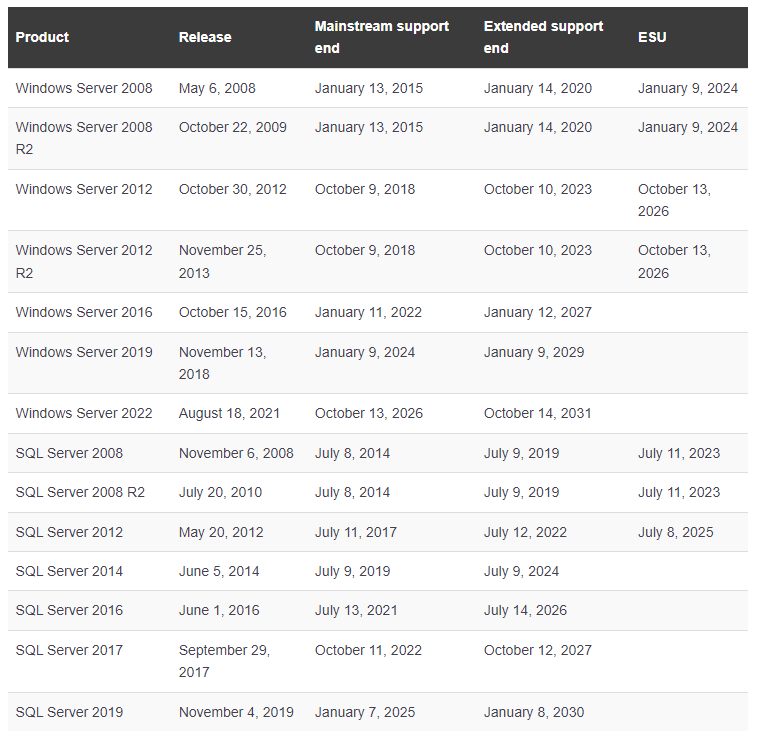Several of Microsoft's Server products will reach end of support in 2022 and 2023. The products are Windows Server 2012 and 2012 R2, and SQL Server 2012. Additionally, Windows Server 2008 and 2008 R2, and SQL Server 2008 and R2, are in their last year of extended security updates.

The lifetime of all products may be extended further. For the 2012 Server products, Microsoft is offering three years of free Extended Security Updates, if machines are migrated to Azure. Only select customers may purchase on-premise extensions. Payments increase from 75% of the full license price in the first year to 125% of the full license price in the third year in that case.
Server 2008 products are already in their last year of Extended Security Updates. Customers may get a free 1-year extension if they migrate to Azure.
Microsoft clarifies that "free" means that there won't be additional charges "above the cost of running the virtual machine".
Here is a quick overview of the important Server deadlines:
- Windows Server 2008 and 2008 R2 remain supported with Extended Security Updates until January 10, 2023.
- Windows Server 2012 and 2012 R2 reach end of support on October 10, 2023.
- SQL Server 2008 and 2008 R2 reached end of support on July 12, 2022.
- SQL Server 2012 reached end of support on July 12, 2022.
Server products that run out of support won't receive any more updates, including security updates but also non-security updates, or technical support.
| Product | Release | Mainstream support end | Extended support end | ESU |
|---|---|---|---|---|
| Windows Server 2008 | May 6, 2008 | January 13, 2015 | January 14, 2020 | January 9, 2024 |
| Windows Server 2008 R2 | October 22, 2009 | January 13, 2015 | January 14, 2020 | January 9, 2024 |
| Windows Server 2012 | October 30, 2012 | October 9, 2018 | October 10, 2023 | October 13, 2026 |
| Windows Server 2012 R2 | November 25, 2013 | October 9, 2018 | October 10, 2023 | October 13, 2026 |
| Windows Server 2016 | October 15, 2016 | January 11, 2022 | January 12, 2027 | |
| Windows Server 2019 | November 13, 2018 | January 9, 2024 | January 9, 2029 | |
| Windows Server 2022 | August 18, 2021 | October 13, 2026 | October 14, 2031 | |
| SQL Server 2008 | November 6, 2008 | July 8, 2014 | July 9, 2019 | July 11, 2023 |
| SQL Server 2008 R2 | July 20, 2010 | July 8, 2014 | July 9, 2019 | July 11, 2023 |
| SQL Server 2012 | May 20, 2012 | July 11, 2017 | July 12, 2022 | July 8, 2025 |
| SQL Server 2014 | June 5, 2014 | July 9, 2019 | July 9, 2024 | |
| SQL Server 2016 | June 1, 2016 | July 13, 2021 | July 14, 2026 | |
| SQL Server 2017 | September 29, 2017 | October 11, 2022 | October 12, 2027 | |
| SQL Server 2019 | November 4, 2019 | January 7, 2025 | January 8, 2030 |
Microsoft is offering an Extended Security Updates extension for customers who run SQL Server 2008/R2 or Windows Server 2008/R2. This time though, customers need to move servers to Microsoft's Azure platform to receive "one additional year of free ESUs" according to Microsoft.
For Windows Server 2012 and 2012 R2, and SQL Server 2012, the situation is similar. Customers may get up to three years of Extended Security Updates, but they need to migrate to Azure virtual machines for that. The extended security updates come at no cost in that case, according to Microsoft.
Only "eligible customers with Software Assurance under an Enterprise Agreement can purchase Extended Security Updates for Windows Server 2012/2012 R2 and SQL Server 2012 running on-premises".
Customers may also upgrade to newer Server releases. Microsoft recommends Windows Server 2019 and SQL Server 2019 as the main upgrade targets, and to test Windows Server 2022.
Server administrators may want to check the Extended Security Updates page on Microsoft's website for additional information on the upcoming changes.
Unlike Server products, Microsoft's Windows 7 operating system won't receive an extension for another year.
Thank you for being a Ghacks reader. The post Microsoft warns admins about upcoming Server retirements appeared first on gHacks Technology News.
0 Commentaires